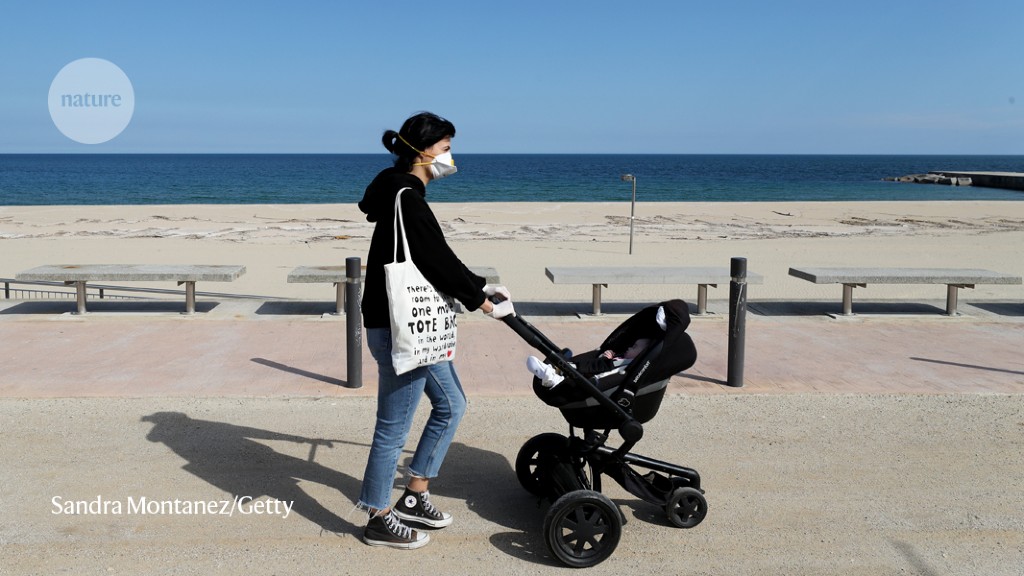COVID lockdowns altered babies’ microbiomes

Isolation can have lasting effects on the composition of microbes in the gut, but links to other health conditions are still poorly understood

Isolation affects the composition of gut microbes that infants acquire during their early months and years.Credit: Sandra Montanez/Getty
Babies born during the early months of the COVID-19 pandemic have a different composition of gut microbes compared with those born before the introduction of lockdowns in March 2020, according to a handful of studies investigating the effects of pandemic control measures on infant health.
The gut microbiome — the colony of microorganisms that reside in the digestive tract — is important to many aspects of bodily function and development, and its imbalance has been linked to psychiatric disorders, skin conditions and gastrointestinal issues.
Babies acquire many gut microbes from their environment, and evidence is emerging to suggest that being born into the unique situation of a lockdown can have a lasting effect on the microbiome, which can, in turn, affect other aspects of infants’ development.
“The first 1,000 days are critical to pick up a healthy microbiome,” says Jun Sun, a microbiome researcher at the University of Illinois in Chicago. Without the proper establishment of beneficial bacteria during this period, babies are at higher risk of health issues further down the line, she says.
Isolated guts
Natalie Brito, a developmental psychologist at New York University, started studying the effects of early-life stress on infants and their gut microbiomes long before the pandemic. As lockdowns began in New York City in March 2020, Brito and her colleagues decided to use the opportunity to assess whether the restrictions would have an impact on infants’ microbiomes. During the first nine months of the pandemic, they remotely collected and analysed samples from 20 newborn babies in the area.
Their findings, published in Scientific Reports on 16 August, identified a lower diversity of microbes in each child and more-distinct profiles between children, compared with a cohort of similar babies that were born before the pandemic1. “The findings were surprising at first,” says Sarah Vogel, a developmental psychologist at Boston University in Massachusetts who was involved in the study. “There was no previous data to predict how a global pandemic might shape the gut microbiome.” But thinking about all the chances to acquire microbes that infants born during lockdown were missing out on, such as visits to playgrounds and shops, and contact with other children, the findings started to make sense, she says.
Not only were the lockdown babies’ gut microbiomes less diverse, but there were alterations in specific bacterial populations. A team of researchers led by Liam O’Mahony, an immunologist at University College Cork in Ireland, studied babies born in Dublin during lockdown and found distinct compositions of bacterial populations in the infants’ guts2. The population of Bifidobacterium is usually affected negatively by antibiotic use and positively by breastfeeding. At the age of 12 months, children born during lockdown had higher than average levels of Bifidobacterium in their guts, likely because they were more likely to have been breastfed and less likely to have caught infections that would require antibiotics. Meanwhile, the population of Clostridia, a class of bacteria usually picked up from the environment, was lower. The team’s work was published on 22 March on the preprint server medRxiv.
“One in four babies hadn’t met another child of their own age” over the course of the study, says co-author Susan Byrne, a paediatric neurologist at the Royal College of Surgeons in Ireland, in Dublin. The combination of staying inside, increased hygiene, decreased social interactions and the heightened stress experienced by many parents are all thought to have contributed to the distinct gut microbiome found in infants born around this time, she adds.
Related conditions
Although it is relatively easy for researchers to measure how the composition of lockdown babies’ gut microbes differs from that of the infants’ pre-pandemic counterparts, it is harder to unravel how these changes might affect overall health and development. The Dublin-based team looked at the prevalence of allergies and eczema, conditions that are thought to be partially mediated by imbalances in the gut microbiome. They found that, in 12-month-olds born during the pandemic, the altered microbiome could strongly predict the risk of developing both conditions The reduced level of Clostridia in the gut from social isolation could be playing a part in this, because an increased risk of these conditions has previously been associated with a lower population of the bacteria3.
The relationship between the gut microbiome and conditions such as allergies and eczema is already well-established, unlike the intricacies of the link between the gut and the brain. Other research teams have shown impaired communication skills in infants born during the lockdowns4. Whether this could be linked to their microbiome is not known — the literature on gut–brain interactions, particularly in human infants, is “scant”, says Vogel.
At the moment, these studies’ small sample sizes and the anecdotal nature of other observations limit how much researchers can generalize when drawing conclusions about the effects of lockdown, Sun says. She adds that there is a need for broader, longer-term studies that monitor children born during the pandemic to learn more about their development. Vogel says that continued research has been restricted by funding, but Brito’s team is investigating a different, larger cohort of pandemic-born infants to continue to monitor their cognitive development and the effects of various factors, including COVID-19 exposure and maternal stress. The Dublin-based team will continue to follow up on their cohort for the foreseeable future, says Byrne.
doi: https://doi.org/10.1038/d41586-023-02994-8
This story originally appeared on: Nature - Author:Lilly Tozer


















